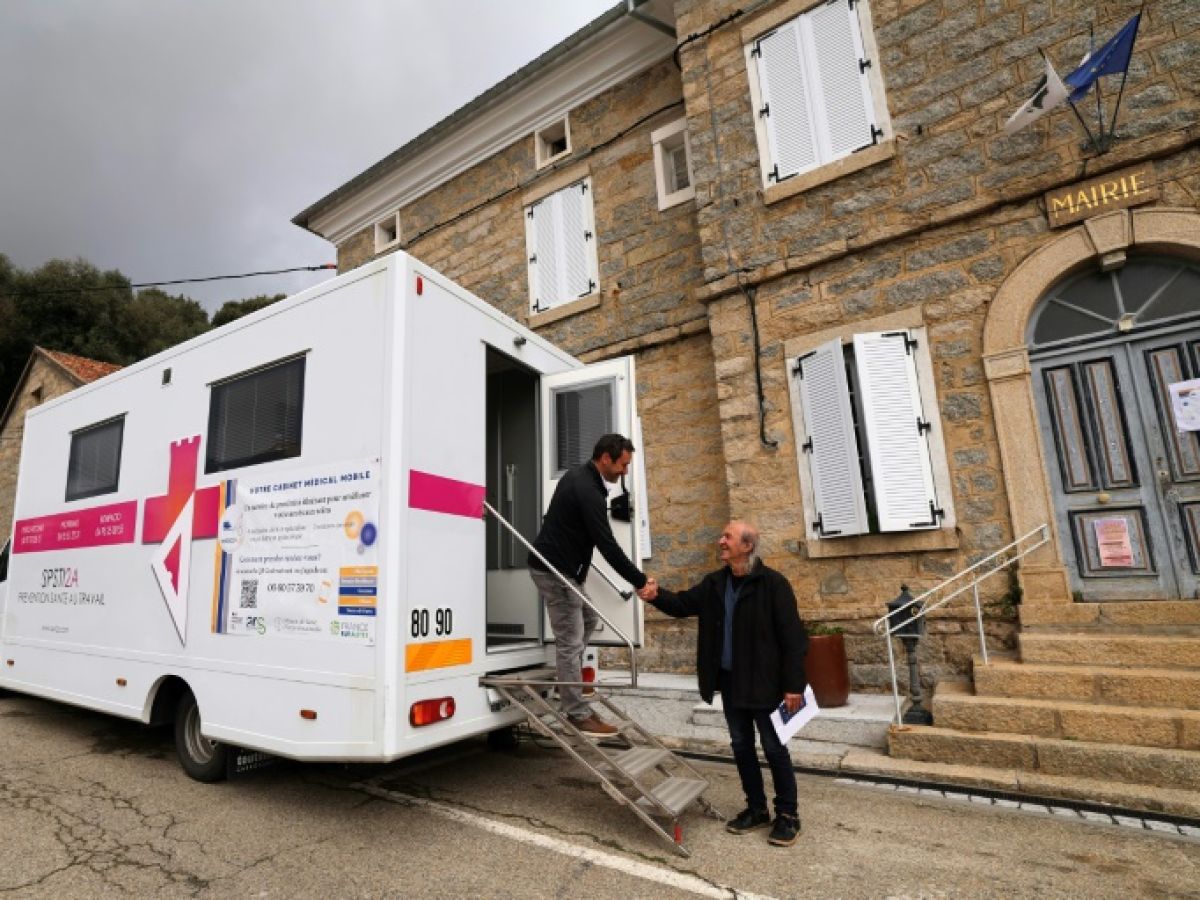Nagging cough, prescription renewal or cancer screening... Nina, seven years old, and Paule, 73, are among the first patients to consult the Médicobus, a mobile medical practice stationed in their village of Pila-Canale (South Corsica).
"I'm coughing a lot," Nina whispers to AFP. Her mother, Maryline Mounier, has just picked her up from the school in the village of 300 inhabitants, twenty meters from the Médicobus.
"It couldn't be better! In 15 minutes, she's seen a doctor and is back at school," says the mother, a 45-year-old childminder, happy to save herself the 45-minute journey to Ajaccio.
Particularly in the face of medical deserts, "the Médicobus is an essential response to guarantee access to healthcare for all. Mothers with their children at school from 8:00 a.m. to 5:00 p.m. who then go to Ajaccio to see a pediatrician are no longer there; there are no more pediatricians who see patients after 6:00 p.m.," emphasizes Dr. Augustin Vallet, the project leader for this mobile consultation, who examined Nina.

Along with three other doctors from the Prunelli medical center, they take turns visiting five villages in Taravo (Olivese, Cozzano, Petreto-Bicchisano, Serra-di-Ferro and Pila-Canale), between Ajaccio and Propriano, for two mornings a month with general medicine, gynecology or pediatric consultations, depending on needs.
"This offer is not competitive with what may exist in our territory, particularly in general medicine," Emmanuel Guglielmi, the mayor of Pila-Canale, explained to AFP, highlighting the concern of patients who do not want to be disloyal to their primary care physicians, of whom there are very few in the area, and of mayors, who have difficulty getting doctors to set up in their town and want to keep them.
– Advanced cancers –
"The great forgotten ones in health are menopausal women," Morgane Chanzy, a 32-year-old general practitioner specializing in gynecology and also working on the Médicobus, told AFP, explaining the importance of bringing gynecological consultations to villages.
"We're seeing more and more cases of advanced breast cancer. We really need to push for screening with the Médicobus," adds Ophélie Luccioni, a 41-year-old private nurse in the area and deputy mayor of Cognocoli, a neighboring village.

"Taravo was chosen for its high number of patients who haven't used their health insurance card for a year," Philippe Mortel, departmental director of the Regional Health Agency (ARS), told AFP. In this area, the number of people suffering from chronic illnesses (diabetes, cancer, heart problems) without a primary care physician is "three times higher than the national average."
He also points out that "many caregivers take care of their parents and neglect their own health. As a result, all women's cancers arrive in Ajaccio very late with worse prognoses."
"The Médicobus is an innovative project" part of a national initiative launched in 2023 by the government "with 11 Médicobuses currently being tested in France and a target of 100 buses to cover areas without a doctor or specialist," he recalls.
It is financed by the ARS to the tune of 100,000 euros and 55,000 euros by occupational health services, the Mutualité sociale agricole (MSA) and the municipalities concerned (electricity, water, etc.).
The vehicle is divided into two reception and consultation areas, with all the equipment of a traditional office, including an internet connection, water, and electricity. It is on loan from the occupational health services of South Corsica, which owns four adapted vehicles, or from the MSA (Medical and Social Services), which owns one. These vehicles have already been used as vaccination buses during the Covid-19 epidemic.
In total, eight consultations took place during the morning, three of which were by appointment, an encouraging trend.
"Anything that helps rural areas is good," assures Paule Bertoncini, a 73-year-old "disabled" retiree suffering from ankylosing spondylitis (chronic joint inflammation) who came for a prescription renewal. "A drive-thru or a grocery store would be good too," she adds.


